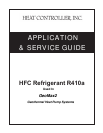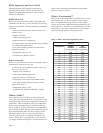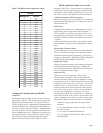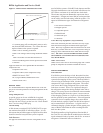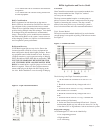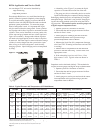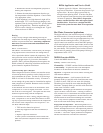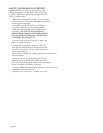
Page 3
R410a Application and Service Guide
Component Considerations for R410a
Compressor
Wall thickness has increased with the increase of operat-
ing pressures of R410a. The internal pressure relief valve
setting has been increased from 375-450 psig for R22 to
550-625 psig for R410a. Although the discharge pressure
is higher in R410a the discharge temperature should be
lower due its higher vapor heat capacity. Desuperheating
hot water generators must be designed around this lower
hot gas temperatures as well. High pressure switches will
now open at 600 psig ±10 psig and reset at 450 ±10 psig.
The compressor oil must be polyolester (POE) based.
Mineral oils should never be used. POE oils absorb
moisture VERY easily. For this reason any compressor
using POE oil should only be exposed to ambient air for
short periods of time during manufacture or service. See
the service section of this manual for more information.
Condenser/Evaporator Heat Exchangers
The heat exchangers must be designed to have a working
pressure above the 600 psig level. In some cases this can
mean a thicker wall.
Filter Driers
Liquid lter driers must have working pressure of no less
than 600 psig and be approved for use with R410a. A
100% molecular sieve with no activated Alumina is rec-
ommended for maximum moisture removal. It is always
required to install a new lter drier whenever the system
is opened.
Suction line lter driers should only be used after a burn
out and should be removed after an appropriate clean-up
time.
Thermostatic Expansion Valves
R410a metering devices are about 15% smaller than R22
devices. The selective charge used in the bulb must be
matched for R410a operation, therefore a TXV must be
designed for R410A use. METERING DEVICES for R22
and R410a are NOT INTERCHANGEABLE.
Refrigerant Tubing
There are no general changes to the tubing other than the
working pressure increase to 600 psig. Generally the
lower refrigerant ow rate of R410a versus R22 does not
result in any pipe diameter changes.
Polyolester Oils
POE oils are VERY hygroscopic. They readily
absorb moisture and hold it. For this reason POE oils
should be limited in their exposure to ambient air during
manufacture or service. The lubricant should be exposed
to ambient air for no more than 15 minutes. Always store
POE oil in glass or metal containers. Pumps are recom-
mended to move the oil from containers to the refrigera-
tion system. If the system is under a vacuum, break the
vacuum with refrigerant or dry nitrogen. It is never
recommended to break the vacuum with air. Liquid line
lter driers should be used to remove any moisture in the
system. Charging system may also contain a replaceable
lter drier for improved moisture removal. In summary:
• POE oil is hygroscopic and will readily absorb
moisture
• Never store POE oil in plastic containers. Always
use metal or glass
• Use a pump to transfer POE lubricants
• Use an approved POE lubricant. They arenʼt all
interchangeable
R410a
TemperatureT
emperature
T Pressure
°F psig
-15 31.3
-10 36.5
-5 42.2
0 48.4
5 55.1
10 62.4
15 70.2
20 78.5
25 87.5
30 97.2
35 107.5
40 118.5
45 130.2
50 142.7
55 156.0
60 170.1
65 185.1
70 201.0
75 271.8
80 235.6
85 254.5
90 274.3
95 295.3
100 317.4
105 340.6
110 365.1
115 390.9
120 418.0
125 446.5
130 476.5
135 508.0
140 541.2
145 576.0
150 612.8
Table 2. R410a Pressure/Temperature Chart



